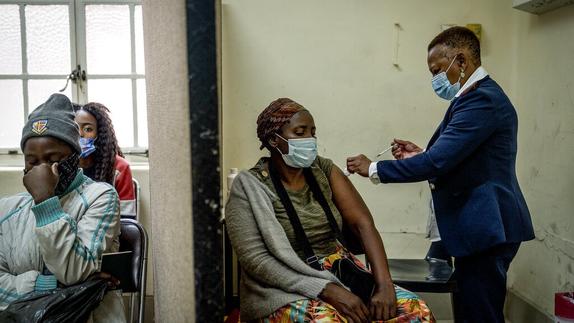 A woman is vaccinated against COVID-19 at the Hillbrow Clinic in Johannesburg, South Africa, on Dec 6, 2021. (SHIRAAZ MOHAMED / AP)
A woman is vaccinated against COVID-19 at the Hillbrow Clinic in Johannesburg, South Africa, on Dec 6, 2021. (SHIRAAZ MOHAMED / AP)
CAPE TOWN / BRUSSELS / BERLIN / MOSCOW - The World Health Organization said on Friday six African countries - Egypt, Kenya, Nigeria, Senegal, South Africa and Tunisia - would be the first on the continent to receive the technology needed to produce mRNA vaccines.
The technology transfer project, launched last year in Cape Town, aims to help low- and middle-income countries manufacture mRNA vaccines at scale and according to international standards.
The WHO established its global mRNA technology transfer hub after large-scale vaccine purchases by wealthy countries and companies prioritizing sales to governments that could pay the highest price. This pushed low- and middle-income countries to the back of the queue for COVID-19 vaccines.
WHO Director-General Tedros Adhanom Ghebreyesus said the pandemic had demonstrated more than any other event how reliance on a few companies to supply global public goods was both limiting and dangerous.
"In the mid- to long-term, the best way to address health emergencies and reach universal health coverage is to significantly increase the capacity of all regions to manufacture the health products they need," he said in a statement.
The hub has already established mRNA vaccine production at laboratory scale and is working towards commercial production. Training of the recipient countries will begin in March 2022.
Primarily set up in response to the COVID-19 emergency, the transfer hub could expand manufacturing capacity to tackle diseases such as tuberculosis and malaria in Africa.
The first recipient of the mRNA technology transfer is consortium partner and partly state-owned South African vaccine manufacturer Biovac, which will mass produce the vaccine once it has passed the necessary safety and regulatory hurdles.
Belgium
Belgium switched the coronavirus barometer to "code orange" on Friday. The hospitality sector can resume its normal opening hours and nightclubs can reopen. All indoor and outdoor public events are also allowed. Teleworking will no longer be mandatory but will still be recommended.
Belgium's consultative committee agreed the new rules on Feb 1, and this means previous rules such as an imposed closing time for bars, restaurants and shops to be scrapped.
A cap maximum of 200 people will be allowed for indoor and outdoor activities, but some indoor activities could be capped at 70 percent of their full capacity depending on air quality and the dynamic nature of the activity.
Other measures will include night shops staying open until usual closing time and teleworking being cancelled, though recommended when possible.
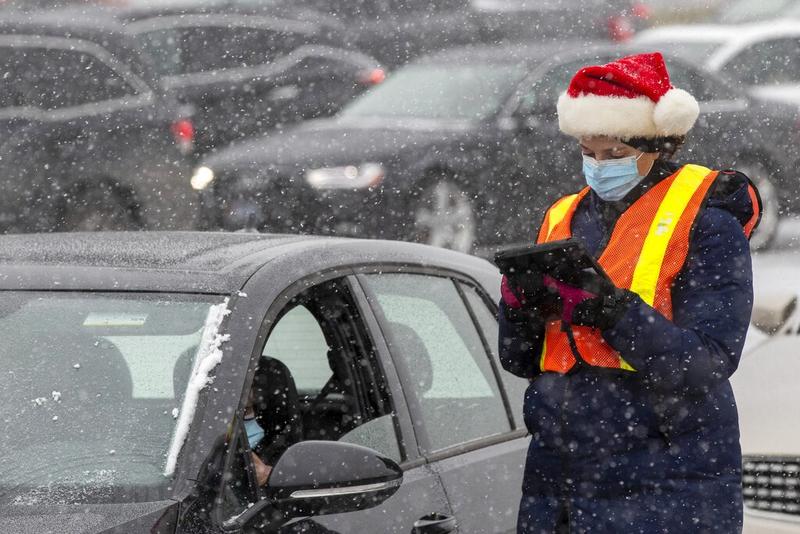 A worker takes information from a driver during a COVID-19 vaccine drive through clinic at St. Lawrence College in Kingston, Ontario, Canada on Dec 18, 2021. (LARS HAGBERG / THE CANADIAN PRESS VIA AP)
A worker takes information from a driver during a COVID-19 vaccine drive through clinic at St. Lawrence College in Kingston, Ontario, Canada on Dec 18, 2021. (LARS HAGBERG / THE CANADIAN PRESS VIA AP)
Canada
Canada has passed the peak of the Omicron variant of COVID-19 and is now in a good shape to handle the pandemic in the future without needing to impose tougher restrictions, chief public health officer Theresa Tam said on Friday.
However, restrictive measures may still be needed if there was a new, severe variant of the coronavirus that escapes vaccine immunity, Tam said.
About 80 percent of Canadians have received two doses of a COVID vaccine, and over 40 percent have also received a third or a booster shot.
Several provinces, including Alberta, Saskatchewan, Quebec and on Monday Ontario, Canada's most populous province, have announced a relaxation of restrictions imposed during the pandemic as coronavirus infection rates fall.
The federal government has also announced a plan to ease entry for fully vaccinated international travelers starting on Feb. 28, allowing a rapid antigen test for travelers instead of a molecular one.
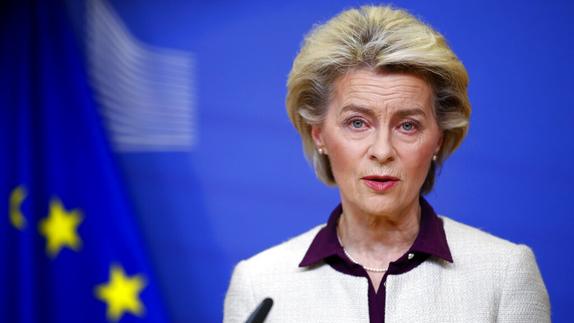 European Commission President Ursula von der Leyen delivers a statement on COVID-19 pandemic at the European Commission headquarters in Brussels, Belgium on Nov 26, 2021. (JOHANNA GERON / POOL PHOTO VIA AP)
European Commission President Ursula von der Leyen delivers a statement on COVID-19 pandemic at the European Commission headquarters in Brussels, Belgium on Nov 26, 2021. (JOHANNA GERON / POOL PHOTO VIA AP)
European Union
Europe and Africa will work together to resolve by spring a rich-versus-poor nation dispute over how to ensure fair distribution of COVID-19 vaccines and treatments, the head of the European Commission said on Friday.
"We share the same goal. We have different ways to reach that goal. There must be a bridge between those two ways," Commission President Ursula von der Leyen told a news conference at the end of a European Union-African Union summit in Brussels.
Von der Leyen said leaders had had a "good, intense, constructive" discussion on the topic and that her Commission and the African Union Commission would work together.
"We will meet college-to-college, meeting here in Brussels in spring and at that time, at the latest, we have to deliver a solution," she said.
Only 11 percent of Africans were fully vaccinated at the start of February, according to the World Health Organization, against a mid-2022 target of 70 percent, which would put it more on par with Europe and other developed regions.
Many developing countries have called for a waiver of intellectual property rights for COVID vaccines and treatments. Rich nations, including many in the EU, say existing rules allowing countries to grant licences to local companies would boost production more effectively.
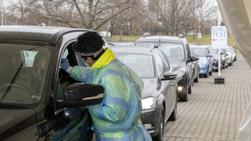 A medical worker takes a swab sample of a car driver at a drive-in COVID-19 testing center in Stuttgart, southwestern Germany on Jan 31, 2022 amid the ongoing pandemic. (THOMAS KIENZLE / AFP)
A medical worker takes a swab sample of a car driver at a drive-in COVID-19 testing center in Stuttgart, southwestern Germany on Jan 31, 2022 amid the ongoing pandemic. (THOMAS KIENZLE / AFP)
Germany
Daily COVID-19 infections in Germany declined as 220,048 new cases were registered within one day, around 20,100 less than a week ago, according to the RKI. The seven-day incidence per 100,000 residents also fell to 1371.1, compared to 1472.2 last Friday.
On Wednesday, the German government agreed on a three-step plan to gradually lift most of the country's COVID-19 restrictions by March 20. Contact restrictions for vaccinated and recovered people as well as entry restrictions in the retail sector were dropped with immediate effect.
"We are in a vulnerable phase," said Minister of Health Karl Lauterbach, calling on the federal states not to go beyond the agreed relaxations. If the anti-pandemic measures were relaxed too quickly, the number of new COVID-19 cases in Germany would start to rise again.
Pointing to the rise of the even more contagious Omicron subtype BA.2, Lauterbach said at a joint press conference with the Robert Koch Institute (RKI) for infectious diseases that the country was "not really in safe waters yet."
Russia
Russia has confirmed 180,071 new COVID-19 cases over the past 24 hours, taking the nationwide tally to 15,020,573, the official monitoring and response center said Friday.
The nationwide death toll increased by 784 to 343,957, while the number of recoveries increased by 198,369 to 12,026,844.
Meanwhile, Moscow reported 8,308 new cases, taking its total to 2,650,927.
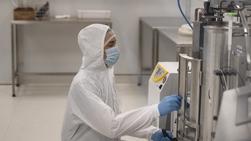 An employee at the Afrigen biotechnology company and Vaccine Hub facility, works in a room housing the bio-reactor, in Cape Town, on Oct 05, 2021. A South African biotech consortium is gearing up to make Africa's first homegrown messenger RNA jab against COVID-19 in a bid to overcome unequal access to inoculations and help the continent towards vaccine autonomy. Backed by the World Health Organization, Cape Town-based Afrigen Biologics and Vaccines is leading the pilot project which will use reverse-engineering to try and get the formula from the Moderna mRNA vaccine. (RODGER BOSCH / AFP)
An employee at the Afrigen biotechnology company and Vaccine Hub facility, works in a room housing the bio-reactor, in Cape Town, on Oct 05, 2021. A South African biotech consortium is gearing up to make Africa's first homegrown messenger RNA jab against COVID-19 in a bid to overcome unequal access to inoculations and help the continent towards vaccine autonomy. Backed by the World Health Organization, Cape Town-based Afrigen Biologics and Vaccines is leading the pilot project which will use reverse-engineering to try and get the formula from the Moderna mRNA vaccine. (RODGER BOSCH / AFP)
South Africa
South Africa's biotechnology company Afrigen Biologics and Vaccines (Afrigen) on Friday confirmed that it seeks to develop a second-generation COVID-19 vaccine that contains less mRNA but with better thermostability, after successfully developing its own mRNA COVID-19 vaccine.
Afrigen, which hosts a World Health Organization mRNA vaccine technology transfer hub that aims to build capacity in low- and middle-income countries to produce mRNA vaccines, announced earlier this month that the Cape Town-based company has developed its own version of an mRNA shot, based on publicly available data on the composition of the Moderna COVID-19 vaccine.
The current vaccine is comparable with Moderna COVID-19 (mRNA-1273) vaccine, as the developer uses the same sequence and processes enzymes, Afrigen Managing Director Petro Terblanche told Xinhua via email.
This vaccine is at the laboratory scale, but will start preclinical confirmatory studies soon, she said, adding that it "will meet all stringent regulatory standards once produced at good manufacturing practice scale."
The WHO said the clinical trials are expected to start in the fourth quarter of this year, with approval expected in 2024.
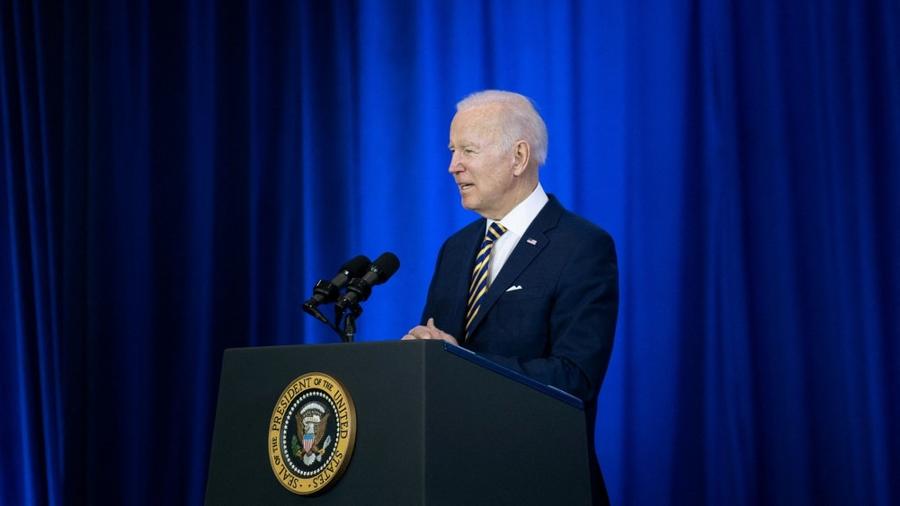 US President Joe Biden speaks about lowering health care costs during a visit to Germanna Community College in Culpeper, Virginia, on Feb 10, 2022. (BRENDAN SMIALOWSKI / AFP)
US President Joe Biden speaks about lowering health care costs during a visit to Germanna Community College in Culpeper, Virginia, on Feb 10, 2022. (BRENDAN SMIALOWSKI / AFP)
United States
President Joe Biden said on Friday the US national emergency declared in March 2020 due to the COVID-19 pandemic will be extended beyond March 1 due to the ongoing risk to public health posed by the coronavirus.
Biden said the deaths of more than 900,000 Americans from COVID-19 emphasized the need to respond to the pandemic with "the full capacity" of the federal government.
Former president Donald Trump had declared a national emergency almost two years ago to free up $50 billion in federal aid.
"There remains a need to continue this national emergency," Biden said in a letter on Friday to the speaker of the House of Representatives and the president of the Senate.
The letter was released by the White House.
The emergency would have been automatically terminated unless, within 90 days prior to the anniversary date of its declaration, the president sent a notice to the Congress stating it is to continue beyond the anniversary date.


